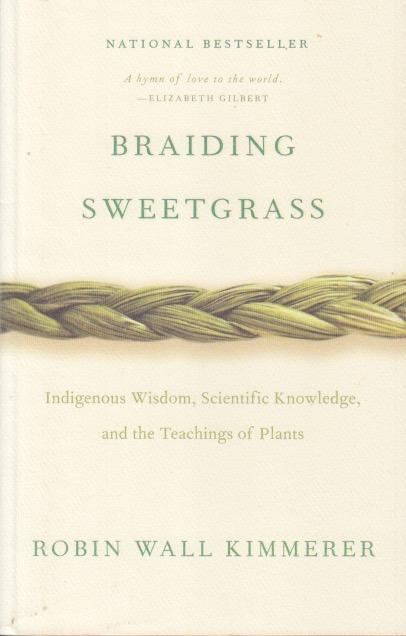
Stealing is something that we all, except some capitalists, know is wrong. I think quite a lot about the land that was stolen to make America possible and I know that simply giving it back isn’t an option. Nevertheless, I do believe that we should listen, and listen attentively to those who’ve been here longer than Europeans. Robin Wall Kimmerer’s Braiding Sweetgrass is an important reflection of this dilemma. Kimmerer is Potawatomi and she’s also a professor of Environmental Biology. The book is a series of essays that focus mostly on plants and what we can learn from them. It also brings in indigenous teaching, contrasting the outlook of gratitude against that of greed. By turns sad, funny, and profound, Braiding Sweetgrass contains a message that is vital to counter climate change. To correct our attitude before it’s too late.
There’s so much in this book that it’s difficult to know what to touch on in this brief notice. Throughout, Kimmerer notes that the First Nations viewed life as a gift. The earth is constantly giving and the native way was to be thankful and to accept the responsibility of being given a gift. Seeing how the European attitude was “take until there’s no more to take,” she points out that taking what you need and leaving for others is a way out of our current dilemma. She does this, most strikingly, by the story of the windigo. The windigo has become popular among monster fans as a consuming beast, but Kimmerer shows how the story has a profound point. If all you do is consume you become a monster. You stop a windigo by showing gratitude.
Perhaps the most striking thing, to me, was how Kimmerer describes her own experience becoming a scientist. How standard academics refused to believe they had anything to learn from Native American outlooks, especially when borne by a woman. How she was told she couldn’t be a scientist, not with that outlook. And how she learned the European way but didn’t give up her native understanding. How she brings two worlds together and does so with a sense of urgency and hope. Things have gone too far simply to turn back the calendar and say that our ancestors had it all wrong, but it’s not too late to learn from those who lived for millennia on this land and were untainted by ideas of private ownership. Those who knew how to live sustainably with nature. Those who knew, and still know, how to defeat monsters.
